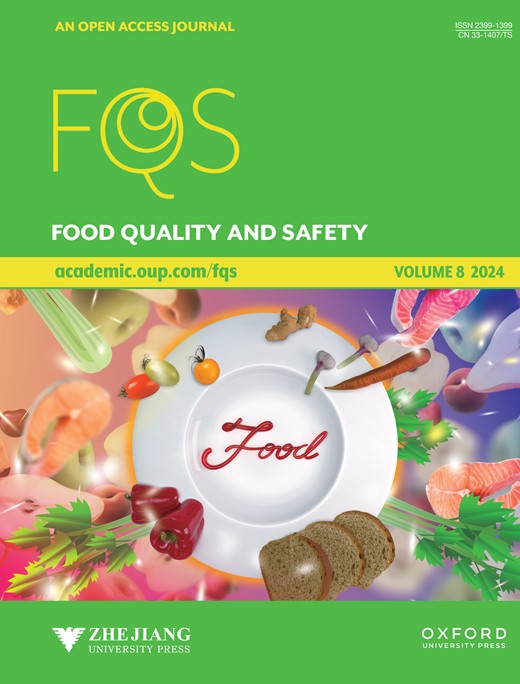Integrative metabolomics and transcriptomics analyses reveal pivotal regulatory mechanisms of 1-methylcyclopropene in maintaining postharvest storage quality of ‘Fuji’ apples
IF 3
3区 农林科学
Q2 FOOD SCIENCE & TECHNOLOGY
引用次数: 1
Abstract
In this study, integrative metabolomics and transcriptomics analyses were conducted to investigate the effects of 1-methylcyclopropene (1-MCP) on apple fruit quality during long-term cold storage. The results showed that 1-MCP (1 μL·L -1) treatment could maintain fruits’ apparent quality (i.e., external color and firmness), inhibit the increase of rot rate and soluble solids content/titratable acidity ratio, decrease ethylene release and respiratory intensity during cold storage, and extend shelf life. Moreover, 1-MCP had long-term effects on the accumulation of many qualities related to metabolites and genes expression in fruits. 1-MCP affected genes related to metabolism at the early stage of storage, specifically those of the glycolysis and tricarboxylic acid cycle pathways. Genes related to the degradation of sucrose, starch, and cellulose were inhibited, and some starch and cellulose synthesis genes were up-regulated by 1-MCP. Apart from ethylene synthesis and signal transduction being inhibited by 1-MCP, there were several enzymes (pectinesterase, pectate lyase, polygalacturonase) involved in pectin degradation, and degradation products of the cell wall (i.e., D-galacturonic acid and D-glucuronic acid) were also strongly inhibited, further maintaining fruit firmness. Cysteine, as precursor glutathione (GSH) related to plant resistance, the synthase gene was up-regulated. However, the expression of genes related to cyanoalanine synthase and amino acid utilization pathways were suppressed by 1-MCP. Collectively, 1-MCP could maintain the postharvest quality of apple fruits.综合代谢组学和转录组学分析揭示了1-甲基环丙烯在维持“富士”苹果采后贮藏质量方面的关键调控机制
本研究采用综合代谢组学和转录组学分析方法,研究了1-甲基环丙烯(1-MCP)对苹果果实长期冷藏品质的影响。结果表明,1-MCP(1μL·L-1)处理能保持果实的外观品质(即外观色泽和硬度),抑制腐烂率和可溶性固形物含量/可滴定酸度比的增加,降低冷藏过程中乙烯的释放和呼吸强度,延长货架期。此外,1-MCP对果实中许多与代谢产物和基因表达有关的品质的积累具有长期影响。1-MCP影响与储存早期代谢相关的基因,特别是糖酵解和三羧酸循环途径的基因。1-MCP抑制了与蔗糖、淀粉和纤维素降解相关的基因,并上调了一些淀粉和纤维素合成基因。1-MCP除了抑制乙烯合成和信号转导外,还有几种酶(果胶酯酶、果胶裂解酶、聚半乳糖醛酸酶)参与果胶的降解,细胞壁的降解产物(即D-半乳糖醛酸和D-葡萄糖醛酸)也受到强烈抑制,进一步保持了果实的硬度。半胱氨酸作为与植物抗性相关的前体谷胱甘肽,其合成酶基因表达上调。然而,1-MCP抑制了与氰基丙氨酸合成酶和氨基酸利用途径相关的基因的表达。1-MCP可以维持苹果果实采后品质。
本文章由计算机程序翻译,如有差异,请以英文原文为准。
求助全文
约1分钟内获得全文
求助全文
来源期刊

Food Quality and Safety
FOOD SCIENCE & TECHNOLOGY-
CiteScore
7.20
自引率
1.80%
发文量
31
审稿时长
5 weeks
期刊介绍:
Food quality and safety are the main targets of investigation in food production. Therefore, reliable paths to detect, identify, quantify, characterize and monitor quality and safety issues occurring in food are of great interest.
Food Quality and Safety is an open access, international, peer-reviewed journal providing a platform to highlight emerging and innovative science and technology in the agro-food field, publishing up-to-date research in the areas of food quality and safety, food nutrition and human health. It promotes food and health equity which will consequently promote public health and combat diseases.
The journal is an effective channel of communication between food scientists, nutritionists, public health professionals, food producers, food marketers, policy makers, governmental and non-governmental agencies, and others concerned with the food safety, nutrition and public health dimensions.
The journal accepts original research articles, review papers, technical reports, case studies, conference reports, and book reviews articles.
 求助内容:
求助内容: 应助结果提醒方式:
应助结果提醒方式:


